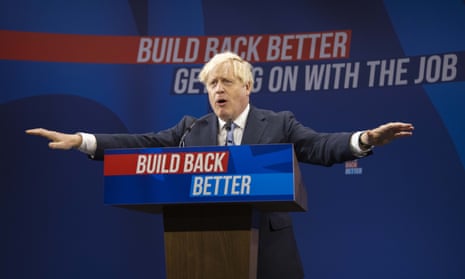There’s nothing original about saying Britain needs a new economic model. Nor that poverty wages should be a thing of the past. Or even that business needs to stop relying on cheap imported labour and invest more in skills training instead.
The idea that Britain needs root-and-branch reform to make it a high-productivity economy has been around for decades. It is voiced every time there’s a scandal involving gang masters or the squalid conditions in which migrant workers have been forced to live.
What’s unusual is that the call for change is coming from Boris Johnson’s government, which has spent the past few days telling UK companies that the days when they could ease labour shortages by whistling up low-wage workers from the EU are over. The prime minister said in his conference speech that it was time to tackle the “long-term structural weaknesses” of the UK economy, which takes some nerve given that the Conservatives have been in charge of this “broken model” for 11 years.
Traditionally, Labour would have much happier suggesting that Britain has lessons to learn from Germany’s economic model, but Johnson thinks the people who provided him with his 80-seat majority in 2019 are turned off by free-market economics and will support a party that offers higher wages, better railways and more money for the NHS.
Johnson went out of his way to praise the private sector and the dynamism of capital, but that seemed like an attempt to mollify business after the savaging they have been getting in Manchester all week. It would once have been unthinkable for a Conservative cabinet minister to go on the radio and accuse business – as Dominic Raab did – of having an “addiction” to cheap imported labour.
This is not ground on which the Conservative party would traditionally choose to fight, not least because the seeds of Britain’s low-wage, service-sector dominated model were sown by Margaret Thatcher when she decimated manufacturing, smashed the trade unions and strongly supported the creation of Europe’s single market.
Predictably, the thinktanks that keep the flame of Thatcherism alive hated Johnson’s speech. The Adam Smith Institute called it “economically illiterate”, describing it as “an agenda for levelling down to a centrally planned, high tax, low productivity economy”.
But Johnson’s Tories appear to have no qualms about picking fights with the businesses that bankroll the party. What’s more, they do so using the sort of political language normally only used by the left.
It goes without saying that all this represents a gamble. In the circumstances, the government’s poll ratings are holding up well, but there’s no guarantee that they will continue to do so if inflation surges and shortages intensify. Parties that preside over falling living standards don’t tend to prosper.
There were times in his speech when Johnson appeared to be inhabiting a parallel universe where motorists did not have to queue for petrol, energy bills were not rocketing and supermarkets were not suffering from shortages. These were dismissed as stresses and strains, the sort of things that happen when the economy is coming out of lockdown.
Yet Johnson clearly thinks this is a gamble worth taking. His aim is to cement the reshaping of British politics that has been under way since the Brexit vote in 2016. The prime minister thinks he has hit on a winning formula with an interventionist, left-of-centre approach to the economy and a tough right-of-centre approach to law and order, immigration and culture wars. In the absence of a coherent alternative from Labour, he could well be proved right.
In theory, this should be happy times for the opposition. Johnson has as good as admitted that Labour has been right in its critique of Britain’s economic failings all along. He has gone out of his way to antagonise business at the start of what looks like being a long, hard winter.
But the upbeat mood of the Tories in Manchester was noticeable by its absence when Labour met in Brighton last week. And one reason is that the Conservatives are united behind a plan for post-Brexit Britain they believe in, while Labour would rather not talk about Brexit at all.
This is not a good place to be – and something the relatively small number of Labour Brexiters feared would happen. They argued – as Johnson is now doing – that leaving the EU presented an opportunity to restructure the economy and warned that if a party of the left did not make a positive case for change, then the vacuum would be filled by the right.
Put simply, Labour has a choice. One option is to stick with its current approach – stay outside the EU, but negotiate a better Brexit deal – and hope that the government is hobbled by economic chaos over the coming months, which is entirely possible but not guaranteed.
Another is to argue that Brexit was a mistake and therefore the party will campaign at the next election to rejoin the EU. This appeals to many party members but after the wipeout of 2019, Keir Starmer and his team have no appetite for a strategy they think would result in a similar result next time.
Finally, Labour could say that it, too, wants to seize the opportunity afforded by Brexit and would make a better fist of renewal than the government. For that, though, two things are needed: a plan of its own, and some of Johnson’s optimism.
Larry Elliott is a Guardian columnist

